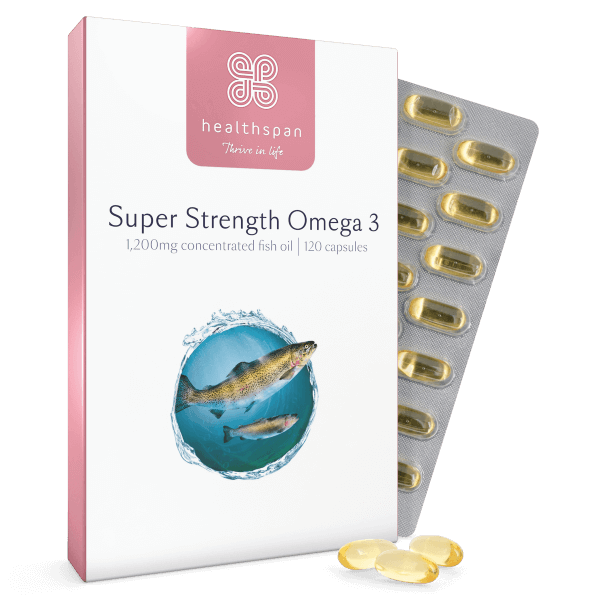High blood pressure, or hypertension, is one of the most common health conditions in the UK, affecting 31% of men and 26% of women. It's important to keep an eye on high blood pressure, as it may put you at risk of developing more serious conditions, including heart disease, stroke and even heart failure.
What is a healthy blood pressure level?
Blood pressure is measured by the pressure that your blood places on the walls of your arteries as your heart pumps blood around your body. It consists of two measurements - systolic blood pressure and diastolic blood pressure.
Systolic is the pressure against the walls of your blood vessels during a heartbeat, whereas diastolic is the pressure against the walls of your vessels between heartbeats.1 By UK GP guidelines, the ideal blood pressure reading is between 90/60mmHg and 120/80mmHg. Hypertension is defined as 140/90mmHg or higher.1
What can high blood pressure lead to?
Over time, high blood pressure can cause long-term health conditions if left untreated. It damages blood vessels, making them less elastic. This can cause cholesterol to build up and block the blood vessels (also known as atherosclerosis), which may lead to a heart attack.2
The heart itself can also be damaged by high blood pressure. Since it is forced to pump harder and quicker than a healthy heart, it can also cause the heart to become enlarged. This can increase your risk of a heart attack and even heart failure.2
In addition, high blood pressure can also lead to temporary blockages in the vessels that supply blood and oxygen to your brain, which can increase your risk of stroke.2
What factors could be increasing my blood pressure?
There are many factors that can contribute to high blood pressure. While some risk factors such as age and genetics are unavoidable, many of the risk factors for hypertension are lifestyle-related. Smoking, excess alcohol intake and high amounts of stress are just a few examples.3
Smoking and alcohol can damage blood vessels by making them less elastic, which can lead to higher blood pressure levels.4 Those who experience high levels of stress are placed at a higher risk of also experiencing high blood pressure.5
Ways to reduce blood pressure naturally
While there are a number of risks associated with high blood pressure, fortunately, there are a number of ways to help reduce it naturally. For every 10mm/Hg that your blood pressure drops, your risk of stroke reduces by 27%, your risk of heart failure by 28%.6 So if you're ready to get your blood pressure under control, we have some simple strategies to get you started.
Manage your stress levels
One of the most common ways that your blood pressure can become elevated is due to high stress levels. Implementing some easy stress management techniques is a simple way to counteract the effects of stress on your blood pressure. One study found that individualised stress management interventions reduced blood pressure by up to 6.1mm/Hg.7 There is also research evidence that supports specific techniques, such as mindfulness and meditation.8
Increase your weekly exercise
One of the simplest ways to reduce blood pressure naturally is through exercise. Many studies have confirmed that aerobic exercise, resistance training and even yoga can help lower blood pressure.9, 10, 11 The good news is that you don't need to be a professional athlete to see results. One study found that just 60-90 minutes of moderate exercise per week for 8 weeks showed a significant reduction in blood pressure.12 Simply choose the form of exercise that you enjoy best and get started.
Follow a Mediterranean diet
There are plenty of foods that can benefit the health of your heart and blood vessels. Many of them are found in a Mediterranean diet. Foods such as oily fish, nuts, seeds, olive oil, fruit, vegetables and wholegrains are Mediterranean staples.
Research has found that a Mediterranean-style diet can reduce both systolic and diastolic BP by 1-2mm/Hg, and greater reductions were seen in the long term.13, 14 By simply basing your diet on these foods, you too could see a drop in your blood pressure.
Consider supplementation
Alongside dietary and lifestyle changes, there are also several supplements that may help to regulate high blood pressure.
Omega 3
Omega-3 fatty acids play a role in supporting normal cardiac function. But omega-3s may also have a beneficial effect on high blood pressure. Studies suggest that omega-3s can cause a small but significant decrease in blood pressure.15 As many people don't consume enough omega-3 through the diet, a supplement is often a better alternative.
Magnesium
Magnesium is considered the 'muscle relaxant' mineral which can have a relaxing effect on blood vessels.16 Two studies found that taking a magnesium supplement may have a small impact on reducing blood pressure.17, 18
By following some of these steps, reducing your blood pressure is easier than you think. Remember to consult with your health practitioner before making any changes to your healthcare plan.

Super Strength Omega 3 1,200mg
Highly concentrated, refined and sustainably sourced omega-3 fatty acids
- 240mg DHA and 360mg EPA
- Anti-inflammatory; supports brain, eye and heart health
- Benefits of oily fish for 22c a day







